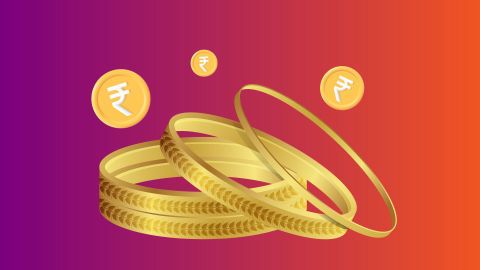Significance of the gold price in Kannur
Kannur, a coastal city in Kerala, is known for its rich cultural heritage, scenic beauty, and vibrant traditions. Gold holds significant importance in Kannur, particularly in social and cultural contexts. It is deeply associated with celebrations like weddings and religious festivals, where gold jewellery is considered a symbol of wealth, status, and security. Many families in Kannur invest in gold as a long-term asset, making it an essential part of the city's economy and tradition.
Gold is a popular investment option in Kannur, and price fluctuations affect both buyers and sellers.
The local economy, demand for gold jewellery, and festivals influence the gold price.
The gold price serves as a barometer for economic stability, often seen as a hedge against inflation.
Higher gold rates encourage more investors, while lower rates boost gold jewellery sales.
Global market conditions, including the strength of the US dollar, impact the gold price in Kannur.
Kannur’s proximity to major gold trading cities also plays a role in the price variations.
Prices vary for 22 carat and 24 carat gold, which affects customer preferences.
Gold price changes influence other financial products, such as gold loans and gold ETFs.
Gold is a popular investment option in Kannur, and price fluctuations affect both buyers and sellers.
The local economy, demand for gold jewellery, and festivals influence the gold price.
The gold price serves as a barometer for economic stability, often seen as a hedge against inflation.
Higher gold rates encourage more investors, while lower rates boost gold jewellery sales.
Global market conditions, including the strength of the US dollar, impact the gold price in Kannur.
Kannur’s proximity to major gold trading cities also plays a role in the price variations.
Prices vary for 22 carat and 24 carat gold, which affects customer preferences.
Gold price changes influence other financial products, such as gold loans and gold ETFs.
How is 22 carat gold different from 24 carat gold?
22 carat gold contains 91.6% pure gold mixed with other metals, making it more durable, whereas 24 carat gold is 99.9% pure, softer, and ideal for investment purposes but less suitable for jewellery. Here’s how 22 carat gold differs from 24 carat gold:
22 carat gold contains 91.67% pure gold, with the rest made up of other metals like silver or copper.
24 carat gold is 99.99% pure, making it the highest purity form of gold available.
22 carat gold is commonly used in jewellery due to its durability, as pure gold is soft and malleable.
24 carat gold is generally used in coins, bars, and investment purposes, rather than jewellery.
22 carat gold has a slightly more reddish-yellow appearance compared to the bright yellow of 24 carat.
The price of 24 carat gold is usually higher than 22 carat gold due to its higher purity.
22 carat gold is ideal for daily wear, while 24 carat gold is more suitable for storing value.
22 carat gold contains 91.67% pure gold, with the rest made up of other metals like silver or copper.
24 carat gold is 99.99% pure, making it the highest purity form of gold available.
22 carat gold is commonly used in jewellery due to its durability, as pure gold is soft and malleable.
24 carat gold is generally used in coins, bars, and investment purposes, rather than jewellery.
22 carat gold has a slightly more reddish-yellow appearance compared to the bright yellow of 24 carat.
The price of 24 carat gold is usually higher than 22 carat gold due to its higher purity.
22 carat gold is ideal for daily wear, while 24 carat gold is more suitable for storing value.
22 carats vs 24 carats vs 18 carats gold purity in Kannur
In Kannur, gold plays a significant role in both cultural and financial contexts, with different gold purities serving distinct purposes.- 22 carat gold contains 91.6% pure gold, with the remaining 8.4% consisting of alloyed metals like silver, zinc, or copper. This blend gives the gold extra strength, making it perfect for crafting intricate jewellery worn daily, especially for weddings and religious ceremonies. In Kannur, 22 carat gold is a popular choice for its balance of purity and durability.
- 24 carat gold is 99.9% pure, making it the highest form of gold available. However, due to its softness, it is not ideal for making jewellery. Instead, it is often used for gold coins, bars, and other forms of investment. People in Kannur often buy 24 carat gold for long-term savings or gifts during special occasions.
- 18 carat gold contains 75% pure gold mixed with 25% other metals, making it even more durable but less valuable than 22 or 24 carat gold. In Kannur, this gold type is chosen for modern, lightweight jewellery designs, especially among younger buyers seeking affordability and style.
Techniques that check the purity of Gold in KannurHere are some common techniques to check the purity of gold:
-

Acid test
A drop of acid is placed on the gold, and the reaction determines its purity.
-

Electronic tester
This technique uses electrical conductivity to measure gold purity.
-

XRF (X-ray fluorescence)
A non-invasive method where X-rays determine the exact composition of the gold.
-

Hallmarking
The Bureau of Indian Standards (BIS) hallmark verifies the purity of gold in Kannur.
-

Float test
Pure gold sinks in water, while impure gold might float due to the presence of other metals.
-

Magnification
Jewellers in Kannur examine gold under magnification to spot any discrepancies in purity.
-

Weight and density measurement
Pure gold has a distinct weight and density that can be measured to verify authenticity.
-
How is the purity of gold evaluated in Kannur?
In Kannur, the purity of gold is evaluated using several methods, with the most common being the karat system. This system measures the proportion of pure gold in an alloy, with 24 karat representing 99.9% pure gold. Jewellers in Kannur often use a BIS hallmark to certify the purity, ensuring trust and transparency. Advanced techniques, such as X-ray fluorescence (XRF), are also used to assess the gold content without damaging the jewellery. Many jewellers provide this service to help customers verify the purity of their gold, ensuring accurate valuation and authenticity.
Things to know before investing in gold in Kannur
One should keep a few key things in mind before investing in gold in Kannur:
Gold purity: Always check the purity level, such as 22 carat or 24 carat, before purchasing gold.
Hallmarked gold: Ensure the gold has a BIS hallmark to guarantee its authenticity.
Current gold rates: Stay updated with the daily gold rates in Kannur to make an informed investment.
Investment options: Evaluate the differences between physical gold, gold ETFs, and sovereign gold bonds.
Storage costs: Consider the costs associated with storing gold, especially if buying in large quantities.
Resale value: Check the buyback policy with jewellers in Kannur for any future resale needs.
Price fluctuations: Understand that gold prices in Kannur can fluctuate based on market demand and global conditions.
Gold loan options: In times of financial need, gold can be used as collateral for loans, providing liquidity.
BIS hallmark: Verify that the jewellery is hallmarked to ensure its authenticity and quality.
Making charges: Be aware of the making charges, which can vary widely across jewellers in Kannur.
Current gold price: Check the day’s gold rate before making your purchase to avoid overpaying.
Weight of the jewellery: Ensure you are charged for the exact weight, as even slight differences can impact the price.
Buy from reputed jewellers: Purchase from trusted jewellers in Kannur to ensure the quality of the product.
Resale value: Understand the jeweller’s buyback or exchange policy before purchasing.
Customisation options: If you are looking for bespoke jewellery, inquire about customisation charges.
Higher liquidity: Gold coins can be easily sold or pledged for loans when there is a financial need.
Purity assurance: Gold coins usually come with high purity, such as 24 carat, making them a reliable investment.
Gift option: Gold coins are popular as gifts during festivals like Onam and weddings in Kannur.
Savings against inflation: People in Kannur buy gold coins as a hedge against inflation and currency devaluation.
No making charges: Unlike gold jewellery, gold coins don’t have additional making charges, making them more affordable.
Tax advantages: There are fewer taxes and charges associated with gold coins compared to other forms of gold investment.
Investment flexibility: Gold coins can be bought in small denominations, allowing for more flexible investments.
Currency fluctuations: Changes in the value of the Indian Rupee against the US Dollar directly affect gold prices.
Local demand: Higher demand for gold jewellery, especially during festivals, can push gold rates higher in Kannur.
Government policies: Import duties, GST, and other government regulations can impact the gold rate.
Economic factors: Inflation, interest rates, and economic stability play a significant role in determining the gold price.
Geopolitical factors: International political tensions and economic crises often lead to higher gold prices.
Supply chain costs: The logistics and costs associated with bringing gold to Kannur affect the final price.
Gold reserves: Central bank gold reserve policies can cause gold rates to fluctuate based on buying and selling actions.
Currency exchange rates: The Indian Rupee’s value against major currencies, particularly the US Dollar, can cause price variations.
Demand fluctuations: Daily changes in demand for gold jewellery and coins in Kannur affect the gold rates.
Economic news: Announcements regarding inflation, interest rates, or economic forecasts can change gold rates overnight.
Government policy changes: Adjustments in tax rates, duties, or gold-related policies can cause price shifts from one day to the next.
Investor sentiment: Global investor trends, especially in safe-haven assets like gold, can cause prices to fluctuate daily.
Gold supply: Changes in the supply of gold to local markets can also lead to price variations.
Speculative trading: Market speculation often results in gold price volatility, leading to day-to-day fluctuations.
Currency value: The exchange rate of the Indian Rupee against the US Dollar plays a crucial role in determining gold prices.
Demand and supply: Local demand for gold, especially during festivals and wedding seasons, affects the gold rates in Kannur.
Import duties and taxes: The government-imposed duties and GST on gold imports contribute to the final price.
Inflation rates: High inflation typically leads to increased gold prices as investors turn to gold as a safe investment.
Interest rates: Lower interest rates often lead to higher gold prices, as gold becomes a more attractive investment.
Gold reserves: Central bank policies regarding buying or selling gold reserves can impact market prices.
Local jewellery market: The demand for gold jewellery in Kannur also plays a part in price determination.
Making charges: Making charges for gold jewellery are also subject to an additional 5% GST.
Import duties: Import duty on gold, currently at around 10.75%, is a significant component of gold prices.
Wealth tax: There is no wealth tax on gold holdings in India, but large purchases must be declared.
Capital gains tax: Profits made from selling gold are subject to capital gains tax based on the holding period.
Tax deducted at source (TDS): For large transactions over ₹2 lakh, TDS may be applicable on gold purchases.
Gold loan taxes: Taking a loan against gold in Kannur may involve certain taxes based on the transaction value.
Custom duties: Additional customs duties may apply to gold imported into Kannur, affecting the price.
Refining and repairing: Many jewellers in Kannur offer services to repair or melt down damaged gold jewellery.
Weight loss during repair: Repairing or refining damaged gold may result in a slight loss of weight, reducing its value.
Jewellery exchange: Some jewellers in Kannur offer exchange programs where damaged gold jewellery can be traded for new items.
Purity check: Before repairing or selling damaged gold, jewellers often check its purity to determine the current value.
Making charges: New making charges are often applied to repaired or exchanged jewellery, which may affect the overall cost.
Certification: If the damaged jewellery is hallmarked, it may still hold good resale value depending on the extent of damage.
Loan against damaged gold: Damaged gold can still be pledged as collateral for a gold loan, with its value assessed by weight and purity.
Lower gold rates: In contrast, a drop in gold rates means you might receive a lower loan amount for the same quantity of gold.
Interest rates: Gold loan interest rates may fluctuate depending on the prevailing market gold prices.
Loan repayment: Rising gold prices may prompt quicker repayment of gold loans to avoid a higher interest burden.
Loan-to-value ratio: The value of the loan in Kannur is closely tied to the gold price, which determines the maximum amount you can borrow.
Gold loan terms: In times of fluctuating gold rates, lenders in Kannur may adjust the tenure or conditions of gold loans.
Resale of pledged gold: If a gold loan defaults, the resale value of the pledged gold will be based on current market prices.
Gold purity: Always check the purity level, such as 22 carat or 24 carat, before purchasing gold.
Hallmarked gold: Ensure the gold has a BIS hallmark to guarantee its authenticity.
Current gold rates: Stay updated with the daily gold rates in Kannur to make an informed investment.
Investment options: Evaluate the differences between physical gold, gold ETFs, and sovereign gold bonds.
Storage costs: Consider the costs associated with storing gold, especially if buying in large quantities.
Resale value: Check the buyback policy with jewellers in Kannur for any future resale needs.
Price fluctuations: Understand that gold prices in Kannur can fluctuate based on market demand and global conditions.
Gold loan options: In times of financial need, gold can be used as collateral for loans, providing liquidity.
What do I need to know when I am buying gold jewellery for the first time in Kannur?
Purity check: Ensure the gold is either 22 carat or 18 carat, depending on the type of jewellery.BIS hallmark: Verify that the jewellery is hallmarked to ensure its authenticity and quality.
Making charges: Be aware of the making charges, which can vary widely across jewellers in Kannur.
Current gold price: Check the day’s gold rate before making your purchase to avoid overpaying.
Weight of the jewellery: Ensure you are charged for the exact weight, as even slight differences can impact the price.
Buy from reputed jewellers: Purchase from trusted jewellers in Kannur to ensure the quality of the product.
Resale value: Understand the jeweller’s buyback or exchange policy before purchasing.
Customisation options: If you are looking for bespoke jewellery, inquire about customisation charges.
Why do people in Kannur buy and sell gold coins?
Investment purpose: Gold coins are bought as a safe investment option to preserve wealth in Kannur.Higher liquidity: Gold coins can be easily sold or pledged for loans when there is a financial need.
Purity assurance: Gold coins usually come with high purity, such as 24 carat, making them a reliable investment.
Gift option: Gold coins are popular as gifts during festivals like Onam and weddings in Kannur.
Savings against inflation: People in Kannur buy gold coins as a hedge against inflation and currency devaluation.
No making charges: Unlike gold jewellery, gold coins don’t have additional making charges, making them more affordable.
Tax advantages: There are fewer taxes and charges associated with gold coins compared to other forms of gold investment.
Investment flexibility: Gold coins can be bought in small denominations, allowing for more flexible investments.
Factors that affect the gold rate in Kannur
Global market trends: International gold prices influence local rates in Kannur due to import dependencies.Currency fluctuations: Changes in the value of the Indian Rupee against the US Dollar directly affect gold prices.
Local demand: Higher demand for gold jewellery, especially during festivals, can push gold rates higher in Kannur.
Government policies: Import duties, GST, and other government regulations can impact the gold rate.
Economic factors: Inflation, interest rates, and economic stability play a significant role in determining the gold price.
Geopolitical factors: International political tensions and economic crises often lead to higher gold prices.
Supply chain costs: The logistics and costs associated with bringing gold to Kannur affect the final price.
Gold reserves: Central bank gold reserve policies can cause gold rates to fluctuate based on buying and selling actions.
Why today's gold rates in Kannur are different from yesterday's gold rates?
Global market conditions: Gold prices are influenced by changes in international markets, which fluctuate daily.Currency exchange rates: The Indian Rupee’s value against major currencies, particularly the US Dollar, can cause price variations.
Demand fluctuations: Daily changes in demand for gold jewellery and coins in Kannur affect the gold rates.
Economic news: Announcements regarding inflation, interest rates, or economic forecasts can change gold rates overnight.
Government policy changes: Adjustments in tax rates, duties, or gold-related policies can cause price shifts from one day to the next.
Investor sentiment: Global investor trends, especially in safe-haven assets like gold, can cause prices to fluctuate daily.
Gold supply: Changes in the supply of gold to local markets can also lead to price variations.
Speculative trading: Market speculation often results in gold price volatility, leading to day-to-day fluctuations.
How are gold prices determined in Kannur?
Global market influence: Gold rates in Kannur are primarily determined by international gold market prices.Currency value: The exchange rate of the Indian Rupee against the US Dollar plays a crucial role in determining gold prices.
Demand and supply: Local demand for gold, especially during festivals and wedding seasons, affects the gold rates in Kannur.
Import duties and taxes: The government-imposed duties and GST on gold imports contribute to the final price.
Inflation rates: High inflation typically leads to increased gold prices as investors turn to gold as a safe investment.
Interest rates: Lower interest rates often lead to higher gold prices, as gold becomes a more attractive investment.
Gold reserves: Central bank policies regarding buying or selling gold reserves can impact market prices.
Local jewellery market: The demand for gold jewellery in Kannur also plays a part in price determination.
What are taxes on gold in Kannur?
GST on gold: A 3% Goods and Services Tax (GST) is applicable on gold purchases in Kannur.Making charges: Making charges for gold jewellery are also subject to an additional 5% GST.
Import duties: Import duty on gold, currently at around 10.75%, is a significant component of gold prices.
Wealth tax: There is no wealth tax on gold holdings in India, but large purchases must be declared.
Capital gains tax: Profits made from selling gold are subject to capital gains tax based on the holding period.
Tax deducted at source (TDS): For large transactions over ₹2 lakh, TDS may be applicable on gold purchases.
Gold loan taxes: Taking a loan against gold in Kannur may involve certain taxes based on the transaction value.
Custom duties: Additional customs duties may apply to gold imported into Kannur, affecting the price.
What happens to damaged gold jewellery in Kannur?
Resale value: Damaged gold jewellery can still be sold, but its resale value may be lower than that of undamaged pieces.Refining and repairing: Many jewellers in Kannur offer services to repair or melt down damaged gold jewellery.
Weight loss during repair: Repairing or refining damaged gold may result in a slight loss of weight, reducing its value.
Jewellery exchange: Some jewellers in Kannur offer exchange programs where damaged gold jewellery can be traded for new items.
Purity check: Before repairing or selling damaged gold, jewellers often check its purity to determine the current value.
Making charges: New making charges are often applied to repaired or exchanged jewellery, which may affect the overall cost.
Certification: If the damaged jewellery is hallmarked, it may still hold good resale value depending on the extent of damage.
Loan against damaged gold: Damaged gold can still be pledged as collateral for a gold loan, with its value assessed by weight and purity.
Impact of gold rates on gold loans in Kannur
Higher gold rates: When gold rates rise, the loan amount you can secure against your gold in Kannur increases.Lower gold rates: In contrast, a drop in gold rates means you might receive a lower loan amount for the same quantity of gold.
Interest rates: Gold loan interest rates may fluctuate depending on the prevailing market gold prices.
Loan repayment: Rising gold prices may prompt quicker repayment of gold loans to avoid a higher interest burden.
Loan-to-value ratio: The value of the loan in Kannur is closely tied to the gold price, which determines the maximum amount you can borrow.
Gold loan terms: In times of fluctuating gold rates, lenders in Kannur may adjust the tenure or conditions of gold loans.
Resale of pledged gold: If a gold loan defaults, the resale value of the pledged gold will be based on current market prices.
Where to take gold loan in Kannur?
For those seeking financial assistance, a gold loan in Kannur is a viable option. We offer attractive gold loan rates and flexible repayment options. The gold loan eligibility criteria are straightforward, primarily based on the value and purity of the gold pledged. Our transparent process ensures quick disbursement of funds, making it convenient for borrowers. The gold and loan process is secure, with the pledged gold stored safely until the loan is repaid. Residents can approach us for reliable and efficient gold loan services, ensuring they get the best value for their gold assets.Learn about gold rates in Indian States and Union Territories
Discover gold rates in other cities
Frequently asked questions
How much is 1 Pavan of gold in Kannur today?
As of today, the price of 1 Pavan of gold (8 grams) in Kannur is approximately ₹38,000 to ₹40,000, depending on the purity of gold (22 carat or 24 carat) and the prevailing market rates. Gold prices fluctuate daily based on global trends, currency exchange rates, and local demand. It’s always advisable to check the latest rates from reliable jewellers or online sources before making any purchase to ensure you’re getting the current and accurate price.
How does the gold rate in Kannur influence gold loan amounts?
The gold rate in Kannur directly affects the loan amount you can secure against your gold. When gold prices are high, lenders offer a higher loan amount for the same quantity of gold, as its market value increases. Conversely, if gold rates drop, the loan amount reduces. The loan-to-value (LTV) ratio is also tied to the current gold price, meaning a higher rate allows for a better borrowing amount, while lower rates may limit the loan size.
Why do gold rates fluctuate in Kannur?
Gold rates in Kannur fluctuate due to various factors, including global market trends, currency exchange rates, and changes in demand and supply. International gold prices, influenced by economic conditions, political events, and investor sentiment, directly impact local rates. Additionally, fluctuations in the value of the Indian Rupee against the US Dollar affect import costs, leading to price changes. Local factors like festival demand and government policies, such as import duties and taxes, also contribute to the daily variations in gold rates.
Show More
Show Less
Bajaj Finserv App for All Your Financial Needs and Goals
Trusted by 50 million+ customers in India, Bajaj Finserv App is a one-stop solution for all your financial needs and goals.
You can use the Bajaj Finserv App to:
Apply for loans online, such as Instant Personal Loan, Home Loan, Business Loan, Gold Loan, and more.
You can use the Bajaj Finserv App to:
Apply for loans online, such as Instant Personal Loan, Home Loan, Business Loan, Gold Loan, and more.
- Explore and apply for co-branded credit cards online.
- Invest in fixed deposits and mutual funds on the app.
- Choose from multiple insurance for your health, motor and even pocket insurance, from various insurance providers.
- Pay and manage your bills and recharges using the BBPS platform. Use Bajaj Pay and Bajaj Wallet for quick and simple money transfers and transactions.
- Apply for Insta EMI Card and get a pre-approved limit on the app. Explore over 1 million products on the app that can be purchased from a partner store on Easy EMIs.
- Shop from over 100+ brand partners that offer a diverse range of products and services.
- Use specialised tools like EMI calculators, SIP Calculators
- Check your credit score, download loan statements, and even get quick customer support—all on the app.






